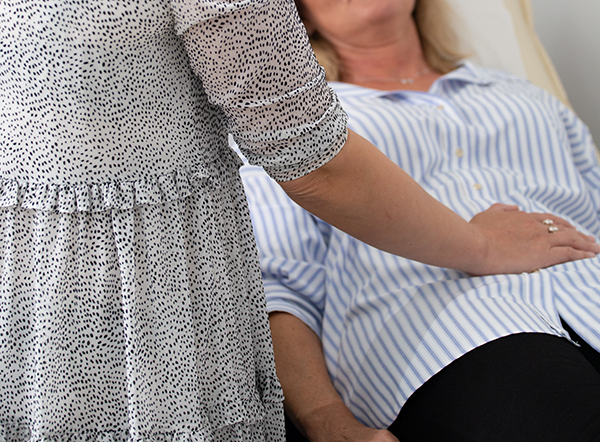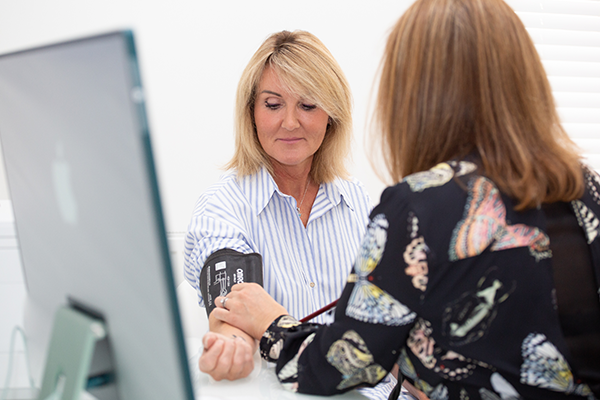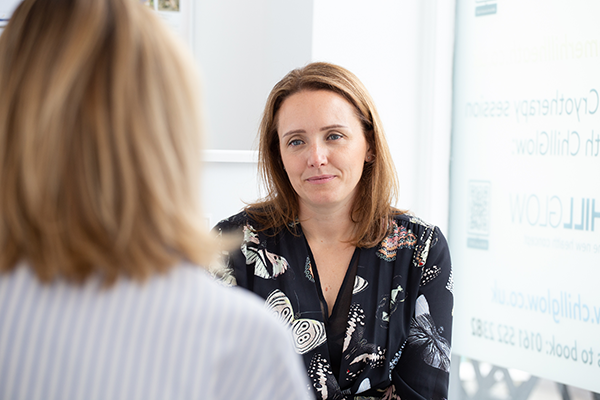Support Centre
Women’s Health
Women’s Health
Women’s health is a general term to describe a wide range of issues that are unique to women and those assigned female at birth. It can also refer to health conditions that men get but that affect women in different ways such as heart disease and diabetes.
It covers gynaecological health, including menstrual disorders, endometriosis, and PCOS, conditions relating to pregnancy, those that affect fertility such as premature ovarian insufficiency, and reproductive health issues like contraception and menopause.
For too long there has been a lack of research and investment in improving diagnosis and in helping women manage these issues. Gender biases in healthcare have resulted in women having to cope with disabling levels of pain, problem periods, and difficult menopauses without adequate support and treatment. Understanding and improving the health of every woman we see in our clinic is an essential part of Summerhill Health’s mission.

Book a consultation.
If you have any questions or concerns about your health, please book a consultation.
Don’t worry alone, we’re here to help.
Contraception
Choosing the right contraception can be confusing and overwhelming but it’s worth understanding more about all the different options to know the implications for your health and to pick the method that best suits your needs. And the ‘best’ method often changes over time – what worked for you in your 20s may not be what’s best for you in your 40s.
The first decision to weigh up is whether you want to rely solely on barrier methods of contraception (condom, cap, diaphragm) which you use at the time it’s needed, or you want to use a longer term option that may alter your hormones to minimise the risk of a pregnancy.
Barrier methods are useful if you’re not having sex very often and your periods aren’t a problem for you. They’re also a choice if you don’t want to take medication or have had adverse reactions to hormone based treatments in the past. But they are heavily dependent on using ‘in the moment’ and fitting correctly. They can also break or become misplaced, which will increase the risk of conception.
Hormonal methods (the pill, depot injections, the implant, patch, ring or coil) are often easier to use and are generally more effective at stopping pregnancy. They last for months or years so protection is more long-lasting. They can also help with improving heavy and painful periods. But they may have side effects and they don’t protect you from sexually transmitted infections.
If you are in a new or casual relationship, or you’re not exclusive, you should use barrier methods even if you are using a hormonal method of contraception, to minimise the risk of contracting a sexually transmitted infection.
Dr Summerhill can offer the following contraceptive methods, so here’s the need-to-know facts to help with your decision:
Contraceptive Pills
There’s two main types of oral contraceptive pill.
Combined pill: this contains two hormones, oestrogen and progestin, and you need to swallow a small tablet every day, usually at the same time of day. You can have a break every month where you don’t take it for a week and have some bleeding at this time, a bit like a period. Or some people take it continuously with no break so they don’t bleed. It can help with heavy, painful periods, but it’s not suitable if you are over 35 and smoke, or if you have certain medical conditions. Side effects can include mood swings, nausea, breast tenderness and headaches (these usually settle down in a few months). There is a very small risk of serious side effects, such as a blood clot and cervical cancer.
Progestin-only pill or ‘mini pill’: this is also a tablet that you swallow every day, but it only contains the hormone progestin. You also need to take this pill at the same time every day to be effective and you take it continuously over the month with no breaks. Your periods may stop or become lighter, or more infrequent. Some women can’t or don’t want to take estrogen, so this type of pill is an option for them. You can also take the progestin-only pill if you’re over 35 and/or you smoke. Side effects may include spotty skin and breast tenderness. If you know you have a sensitivity (intolerance) to progesterone/progestin, this may not be the best type for you.
When taken in a typical, realistic fashion, both of these types of pills are effective 91% of the time, but when taken consistently every day at the same time exactly as prescribed, they are 99% effective.
If you’re interested in trying a contraceptive pill, you can find out more about having a contraception consultation with Dr Natalie Summerhill here.
Implant
This is a small, flexible, plastic rod (around the size of short matchstick) that’s inserted under the skin of your upper arm and releases progestin steadily for 3 years. You will receive local anaesthetic to numb the area before insertion. The implant is useful if you’re likely to forget to take a pill daily. It can be removed at any time and your normal cycle and fertility should return quickly.
When it’s first inserted, you may feel some bruising, or swelling around the implant. Your periods may change and 80% of women have no, or only very light, periods with an implant. The implant is more than 99% effective at stopping pregnancy.
Contraceptive implant removal service in Manchester
You may want the implant removed before the 3 year mark. Our contraceptive implant removal service will ensure this is done safely and with minimal discomfort.
If you would like to know more about having an implant inserted, replaced or removed with Dr Natalie Summerhill, you can find out more here.
Coils / IUD / IUS
There are two main types of coil:
Hormonal coil or IUS: A hormonal coil is an intra-uterine system (IUS) that’s a small, T-shaped plastic device that’s put into your uterus by a healthcare professional. It releases the hormone progestogen and lasts for 3-6 years depending on the brand (Mirena, Levosert, Kyleena, or Jaydess). It can be uncomfortable when the IUS is inserted (it feels similar to having a smear test), but you will be offered pain relief and all steps will be taken to make sure discomfort is minimised as much as possible. The procedure usually only takes a few minutes.
- The Mirena coil can also double up as the progesterone part of your HRT if you take oestrogen for peri/menopause symptoms.
- Kyleena and Jaydess feature lower doses of progestogen so are an option for people with a sensitivity to this hormone.
- Side effects of an IUS are less common than other types of contraception, but some people may experience changes to their mood, skin problems or breast tenderness which usually settle down after a few months.
Non-hormonal Copper coil or IUD: this is also a small T-shaped device covered in a copper lining that is implanted into the uterus but it doesn’t contain any hormones. This intra-uterine device (IUD) works by stopping sperm getting to the egg and by keeping the lining of the womb thin so there’s less chance of implantation of an embryo. It can be uncomfortable when the IUD is inserted (it feels similar to having a smear test), but you will be offered pain relief and all steps will be taken to make sure discomfort is minimised as much as possible. The procedure usually only takes a few minutes.
- An IUD is ideal for women who do not tolerate hormonal medication well.
- Depending on the brand, it can last between 5-10 years, and the more copper in the device, the more effective it is.
- IUDs are generally around 99% effective.
- It is not suitable if you have an infection like PID, gonorrhoea or chlamydia or have uterine fibroids or endometrial or cervical cancer.
- An IUD can also be used as emergency contraception up to 5 days after unprotected sex and is in fact, more effective than the commonly used ‘morning after pill’.
If you would like to know more about having a hormonal or copper coil inserted, replaced or removed with Dr Natalie Summerhill, you can find out more here.
Menstrual Disorders
Symptoms from menstrual disorders can be unsettling and disrupt your daily life. You don’t have to tolerate the inconvenience, pain and negative impact that problem periods can have. If you are experiencing concerns about your periods or your cycle, our clinic is here to help. You may suffer from:
- painful periods
- heavy or prolonged periods
- irregular periods
- absent/no periods (amenorrhea)
- bleeding between periods
- bleeding during or after sex
- premenstrual stress/tension (PMS)
- premenstrual dysphoric disorder (PMDD)
In addition to these types of disorders, there are conditions such as polycystic ovary syndrome (PCOS) and endometriosis that affect your periods and cycle, and can cause ongoing difficulties for women when left untreated.
Problem periods
Period pain is common and is caused when the womb contracts to release blood. For most women, pain is managed by taking over-the-counter pain relief medication, like paracetamol or ibuprofen and using a hot water bottle or warm bath. Some women find gentle exercise helps and there are now products available that you wear on your lower tummy using TENS (transcutaneous electrical nerve stimulation) technology to interrupt the pain signals that go to your brain.
Heavy periods are not unusual, 1 in 3 women describe their periods as heavy and there isn’t always an explanation as to why you have heavy bleeding. Periods may be considered heavy if:
- You bleed through your clothes
- There are clots of blood
- You have to use two period products at the same time or change them very frequently
- It stops you from doing everyday activities.
Some possible causes of heavy periods are:
- Endometriosis [link to lower parag]
- Pelvic inflammatory disease
- Fibroids
- Adenomyosis
- PCOS [link to lower parag]
- Thyroid problems
There are different treatments available including hormone treatments to make your periods lighter or not occur at all (some types of contraception do this), or medicine to lighten the flow, and stronger painkillers if needed. Dr Summerhill might also want to check your iron levels or refer you to other specialists for further investigation.
Irregular periods are also quite common and some women never have a reliable and predictable cycle. Irregular or missed periods can be a sign of:
- pregnancy
- perimenopause
- stress
- chronic disease
- structural abnormalities like endometriosis, polyps, or fibroids
- hormonal variations like PCOS or thyroid problems
- eating disorders and extreme exercise
And some types of contraception cause spotting or a withdrawal bleed that is not the same as a normal period but might be confused for one.
If you bleed in between your usual periods, bleed after sex, or bleed after your menopause, see a doctor about this as it may need to be investigated further.
Book an appointment with Dr Summerhill if your periods are having a negative impact on your life, there is plenty that can be done to improve heavy, painful or irregular periods.
Premenstrual disorders
Symptoms of premenstrual syndrome (PMS) like feeling bloated and being more irritable or tearful are a common of experience of what gets called ‘PMS’, but for some women, symptoms in the days leading up to a period are severe enough to have a real impact on their everyday life.
There may be flash points over the course of your life where PMS bothers you more because hormones are in flux, such as puberty, after pregnancy, when you start, stop or change contraception methods, and during perimenopause.
Over 150 possible symptoms have been identified that can be attributed to the hormone fluctuations in the second half of our cycle. Common psychological or behavioural symptoms are:
- mood swings
- low mood
- tiredness
- lethargy
- anxiety
- tearfulness
- irritability
- aggression and anger
- feeling out of control
- poor self-image
- confusion and forgetfulness
- interrupted sleep
- food cravings.
Common physical symptoms are:
- full and painful breasts
- bloating
- constipation
- cramps
- headaches
- skin breakouts
- allergy flare ups
- being more clumsy than normal.
You may only get one or two of these symptoms or several of them, and find they vary in severity during the second half of your cycle and from cycle to cycle. Some women don’t get relief from their symptoms until their period starts, or when it’s the heaviest day of their flow.
There is a severe type of premenstrual disorder that is now more widely recognised and understood. Premenstrual Dysphoric Disorder or PMDD affects up to 5% of reproductive-aged women.
PMDD involves a similar set of symptoms as premenstrual syndrome but they are experienced more severely. It especially affects women’s emotional wellbeing, and the feelings are very real even if they realise it is their PMDD making them feel that way. Feelings may also include:
- lack of energy
- hopelessness
- suicidal feelings
- feeling tense or on edge
- feeling overwhelmed or out of control
Diagnosing premenstrual disorders
There are no blood tests to diagnose PMS or PMDD. So if you want help, it’s important to keep a log of your periods and record your symptoms each month.
There are plenty of tools and apps to help you do this. Keep track for at least 3 months so you have a good picture of what your cycles are like. The timing of your symptoms and how much they impact your life are key factors your doctor will want to understand.
For PMDD, there is defined criteria to diagnose it:
- There must be 5 or more symptoms from a set list, and they have to occur in the majority of cycles over a 12-month period
- Symptoms must include some of the following: marked depression, anxiety, tearfulness, irritability and anger, increased appetite, insomnia, feeling overwhelmed or out of control, and some physical symptoms
- Your symptoms interfere with your ability to function in your everyday life
- Symptoms are not related to or exaggerated by other medical conditions or treatments.
Ways to help premenstrual disorders
- Limit your intake of caffeine, alcohol and cigarettes
- Address and manage stress in your life
- PMS-friendly diet changes involve cutting down excess salt and sugar, reducing white refined carbs (like pizza and white bread), change to carbs with slower release of glucose like wholegrain/brown options and low GI veg, up your essential fats and Omega 3 oils, have vegetables rich in fibre, magnesium and folic acid, and B vitamins as this can help with PMS symptoms. A diet rich in calcium and vitamin D will also lower your chances of PMS.
- You may wish to try supplements including calcium, vitamin D, chasteberry (Vitex), vitamin D, magnesium, isoflavones, and St John’s Wort – while not evidence-based, some women find them beneficial.
- Aerobic exercise (and anything that raises your heart rate) boosts endorphins that can help relieve stress and pain. Yoga may help with bloating and improve your energy and mood.
Other treatments you may wish to discuss with your doctor are:
Low dose antidepressants (SSRIs) may improve mood, emotional stability and sleep. Women with PMS have been shown to have low serotonin levels. Sertraline and citalopram can be beneficial either throughout the month or when prescribed only for the luteal phase.
Cognitive Behavioural Therapy (CBT) – this has been shown to have the same benefit as antidepressants for improving low mood, anxiety, and associated behavioural symptoms.
The combined oral contraceptive pill (COCP) is the most commonly used contraceptive to ease PMS symptoms as it stops ovulation from happening and reduces the rise and fall of oestrogen and progesterone so there won’t be the same triggers for PMS
If none of the above helps, oestrogen therapy or HRT may be considered to balance out your progesterone in the luteal phase.
If your premenstrual symptoms are severe and interfering with everyday functioning, book an appointment with Dr Summerhill and she can talk you through your options for treatments.
Polycystic Ovary Syndrome (PCOS)
PCOS affects around 1 in 10 women though experts believe that 50-75% of people with PCOS are unaware they have it. It is a hormone disorder that affects how your ovaries work and stops ovulation occurring. When there’s no ovulation, the ovaries become enlarged with fluid filled sacs that produce androgen (‘male’) hormones in larger quantities than normal.
Symptoms include:
- irregular periods
- increase in androgen hormone can lead to unwanted hair growth on face and body and male patterned baldness
- polycystic ovaries – despite this name, the fluid-filled sacs are not actually cysts.
Most doctors would look for two or all of these features to be present in order to diagnose PCOS.
As well as the three features above, there may also be:
- weight gain
- acne and oily skin
- skin tags
- dark or thick patches of skin on back of neck, armpits and under breasts
- difficulties getting pregnant.
Diagnosis can sometimes be prolonged but while there is no cure, there are effective treatments for this condition.
Treatments
Your typical diet, weight, and level of physical activity will be discussed as these impact PCOS and symptoms you may experience.
- a Mediterranean diet has been found to help PCOS symptoms
- if you are overweight, losing weight can reduce symptoms and help to regulate menstrual cycles
- good nutrition and regular exercise will help your body use insulin more efficiently, lower blood glucose levels and may help ovulation if you are aiming to improve your fertility. There are also medications you can take to help you ovulate.
- If you’re not looking to become pregnant, contraception is often used to regulate your menstrual cycle and reduce levels of androgen hormone.
- Contraception may be suggested as a treatment for PCOS even if you are not sexually active or you’re in a same-sex relationship to treat the primary symptoms.
- a medication known as spironolactone is anti-androgen and can also help reduce acne and hair growth
If you think you may have PCOS, it’s important to seek a diagnosis for your symptoms as if left untreated, there is an increased risk of developing type 2 diabetes, high blood pressure and cholesterol levels, cardiovascular disease, and cancer of the uterus.
However, because there are effective treatments available, PCOS does not need to negatively impact your life or hopes for having children, if you want this.
Useful Information
You can find useful information on these websites.

Primary Ovarian Insufficiency (POI).
Helpful advice from The Daisy Network.

Menopause Matters.
Menopausematters.co.uk is an award winning, independent website providing up-to-date, accurate information.

Pre-Menstrual Syndrome support (PMS).
Useful information from the National Association for Premenstrual Syndromes.

Are you experiencing menopause symptoms?
Take our free, online menopause assessment to help identify your symptoms and where you might be on your menopause journey.
Menopause Assessment
